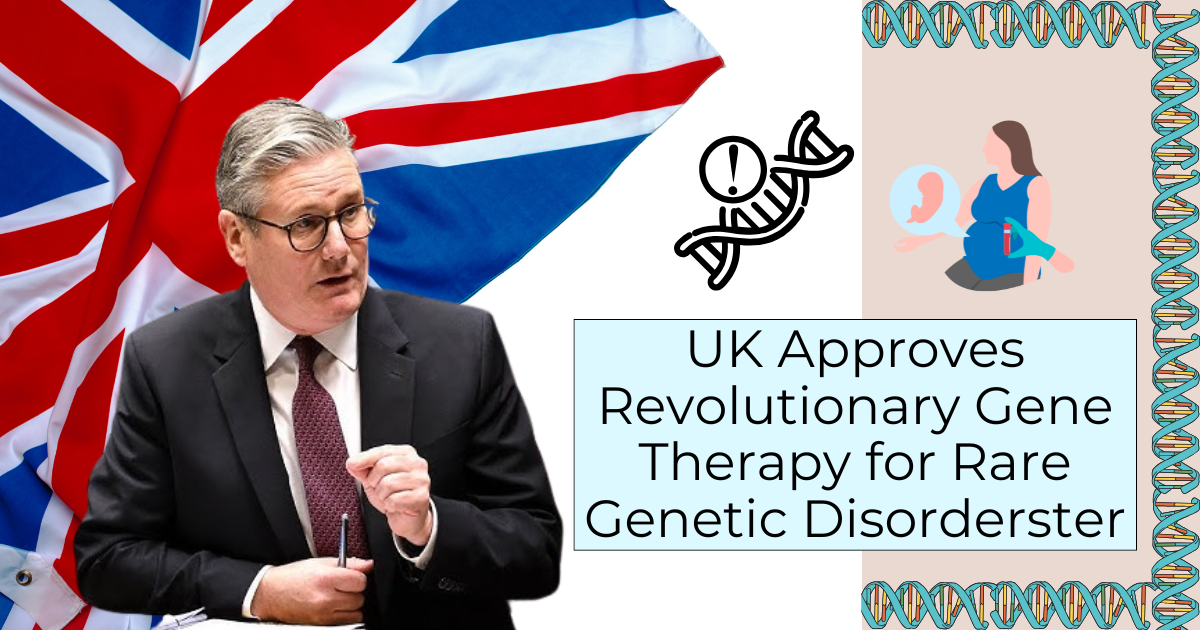UK Approves Revolutionary Gene Therapy for Rare Genetic Disorders. The government of the UK has approved revolutionary gene therapy for people with rare genetic disorders. This therapy is to provide patients suffering from sickle cell disease a chance to get rid of this disease permanently. To know more about the topic UK Approves Revolutionary Gene Therapy for Rare Genetic Disorders, please keep reading the article.
UK Approves Revolutionary Gene Therapy for Rare Genetic Disorders
People living with rare genetic blood disorders in England will be provided a new treatment on the NHS that will change their lives. The NHS patients with sickle cell disease will be able to profit from a revolutionary gene-editing treatment that presents the possibility of a cure for the condition. The new therapy, called Casgevy, is based on CRISPR gene editing and has been authorized by the Medicines and Healthcare Products Regulatory Agency (MHRA) following two global clinical trials, with Imperial College Healthcare NHS Trust leading the UK arm.

Check Payment Dates
Check New Payment Amount
Check Payment Increase News
Check New Eligibility Criteria
The MHRA said the treatment could be applied to patients aged 12 and over “after a rigorous assessment of its safety, quality, and effectiveness.” Sickle cell disease is a group of genetic blood disorders that impact approximately 100,000 people in the U.S. It is most common in African Americans and, while less common, it also affects Hispanic Americans. The primary problem in sickle cell disease is a change in hemoglobin, a protein found in red blood cells that delivers oxygen to the body’s tissues. This change causes red blood cells to grow into a crescent or “sickle” shape. These sickled red blood cells restrict the flow of blood cells to develop a crescent or “sickle” shape.
The MD., director of the Office of Therapeutic Products within the FDA’s Center for Biologics Evaluation and Research, Nicole Verdun, said, “Sickle cell disease is a rare, debilitating, and life-threatening blood disorder with significant unmet need, and we are excited to advance the field, especially for individuals whose lives have been severely disrupted by the disease, by approving two cell-based gene therapies today.” “Gene therapy holds the promise of delivering more targeted and effective treatments, particularly for individuals with rare diseases where the current treatment options are limited.”
The one-off gene therapy, known as exagamglogene autotemcel (or ‘exa-cel’), has been authorized for use on the NHS in England by the National Institute for Health and Care Excellence for older children and adults with a severe form of sickle cell disease.
Clinical trials suggest exa-cel can stop painful and unpredictable sickle cell crises—the most common symptom of sickle cell disease—where blood vessels become blocked, causing severe pain, with experts saying the therapy provides patients a chance at disease-free life.
Another disease that may be cured permanently by this revolutionary gene therapy is thalassemia. Thalassaemia is the name of a group of genetic blood disorders in which insufficient hemoglobin is produced by the body. It affects about 2,300 people in the UK, who are mainly from a Mediterranean, Asian, or Middle Eastern background. Many people with beta-thalassemia are not expected to live past their 50s.
This therapy is a hope for many people suffering from this inherent disease to get a lifetime cure. In international clinical trials, 93% of patients with beta-thalassemia did not need a blood transfusion for at least a year after having the treatment. Amanda Pritchard, the chief executive of the NHS, said: This is a historic moment for people living with beta-thalassemia, with a potential cure for those facing this debilitating disorder now available on the NHS.” “Ordinarily, patients experience painful side effects and undergo regular transfusions, which severely impact their quality of life, but this therapy offers people a life free from that, as well as the hope of living longer, which is truly amazing news.”
How Does the Gene Editing Treatment Work?
Casgevy is intended to work by specifically editing the genes in a patient’s bone marrow stem cells to allow the production of a functioning hemoglobin. The treatment consists of mobilizing stem cells out of bone marrow and obtaining them from the patient’s blood. CRISPR gene technology is used in a laboratory—a pair of molecular scissors cuts a strand of DNA at a specific site, essentially disabling the faulty gene. The edited cells are then introduced back into the patient, enabling the body to generate functioning hemoglobin.
In the two worldwide clinical trials of CASGEVY, 39 out of 42 patients with beta-thalassemia no longer required blood transfusions for at least a year, and 28 out of 29 sickle cell patients were free of severe pain.
